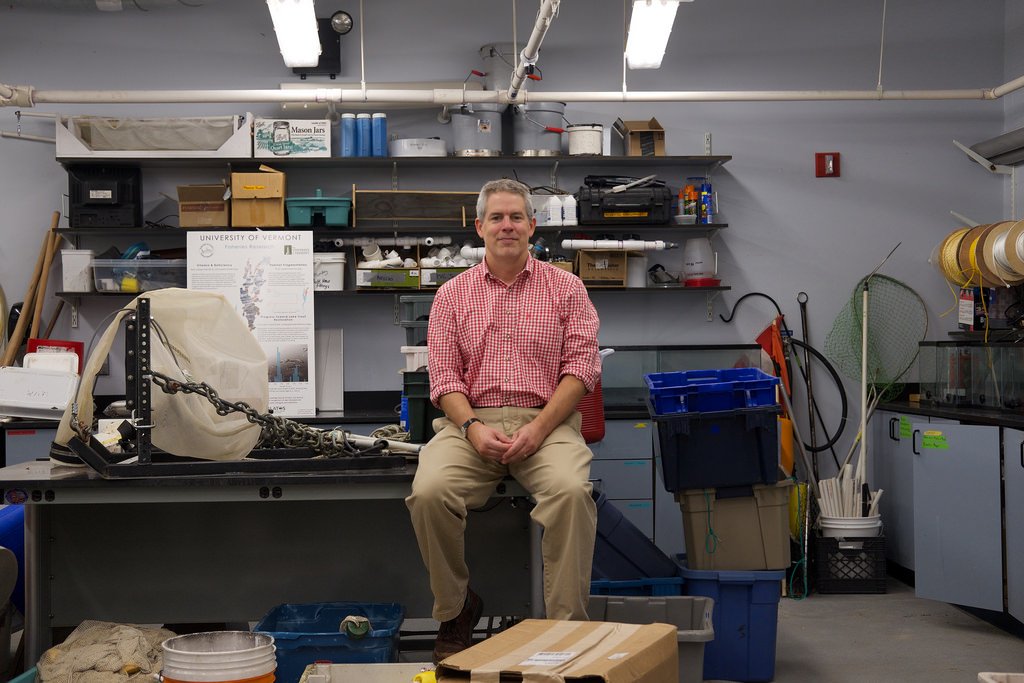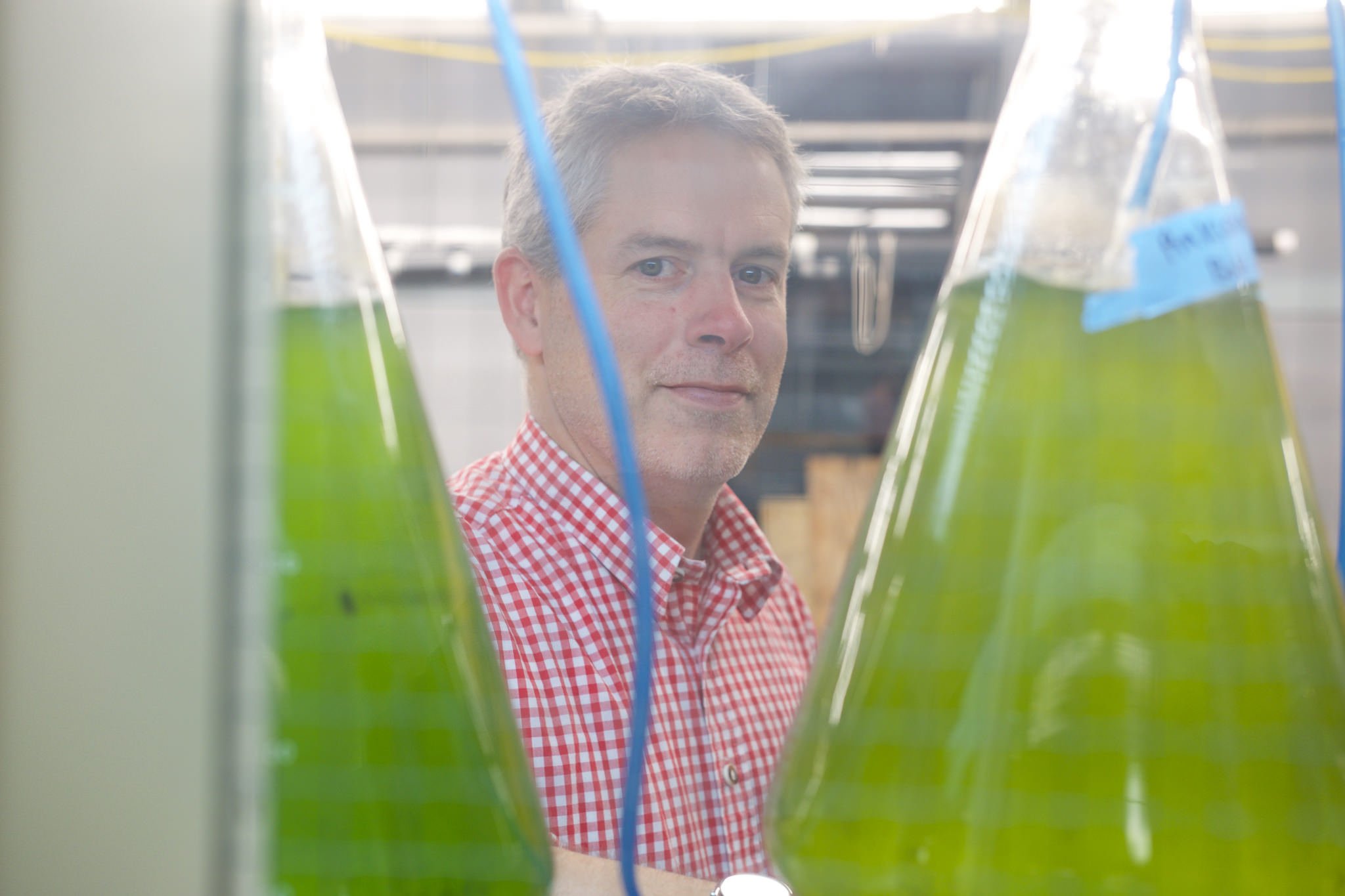Local Pulse, Global Context
By Caelyn Radziunas
November 16, 2016
Consider the impacts of climate change: events of a grand scale likely come to mind, such as glaciers crumbling as they weaken in the rising heat. Although powerful, these abstract images have a tendency to obstruct another reality of climate change: local climatic changes are already being witnessed at a minute level in phytoplankton, aquatic microorganisms which serve as excellent water quality indicators.
How these tiny organisms respond to the impacts of climate change is of concern to Dr. Jason Stockwell, Associate Professor in the University of Vermont’s Rubenstein School of Environment and Natural Resources and Director of the Rubenstein Ecosystem Science Lab. Specifically, Stockwell is interested in investigating the effects of storms on lakes and examining how those effects transfer into biology. “Having a better idea of how storms may impact the function of lake systems at their basic, primary level of productivity has a lot of important implications for water quality,” says Stockwell. “Hopefully what we find will be applicable to help look at storm impacts and their relationships to water quality or services that water systems provide to people.”
Stockwell is a Project Co-Lead for “Storm-Blitz,” a global research initiative to assess the effects of physical disturbances on water column stability and how those changes impact phytoplankton communities. Through a Storm-Blitz investigation, “Global Evaluation of the Impacts of Storms on freshwater Habitat and structure of phytoplankton Assemblages,” (GEISHA) he and his colleagues will analyze the responses of phytoplankton communities to storm events. This study will be performed in approximately 25 lakes across the world, ranging from France’s Lake Geneva to Lake Võrtsjärv in Estonia. Despite the international scope of this project, Stockwell’s focus lingers close to home. “We are going to see how the processes that might be happening in Lake Champlain - with regard to storm events - [fit] into what’s going on elsewhere in the world,” he explains.
In 2013, Stockwell began his involvement with Storm-Blitz, when he was invited to join UVM colleague Dr. Beverley Wimple in attending a meeting of the Global Lake Ecology Observatory Network (GLEON).
GLEON, a grassroots community of experts in engineering, ecology, information technology, and limnology, seeks to understand how environmental changes affect lake processes. Of particular importance are major ecological events, such as abnormal weather patterns brought about by climate change. As the changing climate is expected to accelerate the hydrologic cycle, scientists anticipate an increase in either storm frequency or severity and duration. Among the goals of GLEON is to encourage and support global scientific collaborations; this vision is realized by the Storm-Blitz team with support from the Centre de Synthése et D’Analyse sur la Biodiversité in France and the USGS Power Center in Colorado.
Stockwell recalls from his first GLEON meeting; “one group was working on springtime — how the warming rates in spring may affect phytoplankton communities.” After having been conceptualized for several years, Storm-Blitz was formalized at this 2013 meeting.
Phytoplankton communities, which can include toxic algal blooms, can function as indicators of water body health. Eutrophic waters, hotbeds of phytoplankton productivity, increase the potential of illness in humans utilizing the water source, whether through recreational or daily use. Therefore, an understanding of these communities is essential in assessing water quality.
The specific effects of a changing climate on phytoplankton, and ultimately water quality, is a growing field of research. One of the greatest challenges to performing such a study is found in project scale. In order to infer information about water quality on a global level, the study must be just that: global.
Comprised of experts from a total of seven countries and three continents, Storm-Blitz seeks to provide such a lens for analyzing the impact of changing meteorology patterns on freshwater systems. Having been closely monitored as part of the Lake Champlain Long-Term Monitoring Project (LTMP) since 1992, Lake Champlain stands out among the project’s 25 heavily studied lakes.
“It is very exciting,” says Stockwell. “We can get a local pulse in a global context.”
As a Project Co-Lead, Jason Stockwell will be overseeing two major components of the collaboration: data compilation and interpretation.
“There is no doubt the way people collected [the data] or the different equipment used, or the scales that they collected them at, they are all going to be different,” Stockwell explains. “What we are going to have to do is take all these data and try to integrate them and try to get them to a similar scale. Once we have the data compiled and in a standard format, then it’s going to be a matter of basically doing analyses, trying to look for signals of storm events.”
Professor Stockwell projects that the information gathered through the Storm-Blitz project has the potential to set the foundation for what he refers to as “forecast protocols” for future research. In addition to providing a common definition of “storms,” these protocols would set the parameters for detecting storm events.
“I hope the research produces new ways of looking at how lakes will respond to storm events; new frameworks for - not just storm events - but perhaps the timing of storm events.”
GEISHA, which is proposed to run until December 2019, seeks to provide insights into the ways in which storms affect the composition and viability of phytoplankton communities. With this information, researchers like Stockwell may develop a greater sense of how an increase in storm severity will impact the quality of our water systems. As storm events are predicted to swell to new extremes under the influence of climate change, the relevance of Storm-Blitz will only continue to increase.


